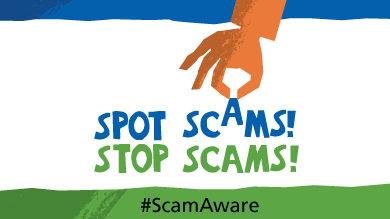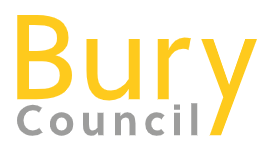
Press release -
Fight back against scammers in Bury
Websites, letters, phone calls or doorstep sellers – do their offers sound too good to be true?
Trading standards are calling on Bury residents to be on the lookout for dodgy dealers – and
report them.
In partnership with the Citizens Advice Bureau, they are running Scams Awareness Month in May.
Scams can range from bogus online adverts to tricksters using dating websites to build
relationships with people they later defraud. Other common types including ‘phishing’ emails and ‘vishing’ phone calls designed to con people into giving away sensitive information, investment scams, and advance fees requested to claim unexpected lottery wins.
Fewer than five per cent of people in the UK report scams to the authorities, so trading standards
have said that it is time to “fight back against scammers” to ensure they don’t get away with conning innocent people. People should report dodgy adverts or sales pitches to the authorities and speak to a friend or relative first about any out-of-the-blue offers they get on the doorstep, by phone or email.
Angela Lomax, commercial practices manager with Bury Council trading standards,said: “It’s time for us to give scammers the shove. By telling us about a scam we can stop the con artists in their tracks and make sure no one else falls foul of their tricks.
“This month we will be telling people what to look out for, what kind of scams there are, and giving advice if you think you might have been a victim.”
Top tips for dealing with scams:
* If it sounds too good to be true, it probably is.
- It you haven’t bought a ticket – you can’t win it.
- You shouldn’t have to pay anything to get a prize.
- If in doubt, don’t reply. Bin it, delete it or hang up.
- Persuasive sales patter? Just say: “No thank you”.
- Contacted out of the blue? Be suspicious.
- Never give out your bank details unless you are certain you can trust the person contacting you.
- Take your time – resist pressure to make a decision straight away.
- Never send money to someone you don’t know.
- Walk away from job ads that ask for money in advance.
- Your bank will never attend your home.
- Your bank and the police will never collect your bank card.
- Your bank and the police will never ask for your PIN.
- Computer firms do not make unsolicited phone calls to help you fix your computer.
- Don’t suffer in silence – tell others about scams.
- Scams to watch out for:
- Online shopping and auction scams – internet shoppers are lured into buying phantom cars, mobile phones, pets or anything else you can buy online. Scammers use a range of tricks including bogus websites, spoof payment services and a nasty new variation called “second chance offers”, tempting losing bidders with bogus opportunities. Online property marketplaces are also infiltrated by scammers harvesting legitimate property details and posing as landlords.
- Investment fraud – also called “boiler room” scams because of the high-pressure sales techniques employed. Shares remain the most common product offered, but they also ask for investment in carbon credits, land, and rare earth metals.
- Dating scams – using online dating websites, scammers groom victims into long-distance relationships using emails, instant messaging, texting and phone calls. Once they are confident of the victim’s trust, scammers will tell them about a problem they are experiencing and ask for financial help.
- Software scams – fraudsters often use the names of well-known companies to commit their crime as it gives a mask of legitimacy to their schemes. Methods include asking for credit card details to “validate” copies of operating systems, stealing personal information, and installing ‘malware’ before charging to remove it.
- Courier scams (a form of vishing) – where people receive unsolicited telephone calls from scammers posing as the police or their bank warning of a fraudulent payment on their card or that their card is due to expire. The fraudster will then attend the person’s address or send an innocent courier company driver to collect the card and sometimes provide them with a “replacement” fake card.
What to do if you have been scammed:
- Report it to Action Fraud on 0300 123 2040 to help stop it happening to others.
- You can't always get your money back if you've been scammed, especially if you've handed over cash.
- If you've paid for goods or services by credit card you have more protection and if you used a debit card you may be able to ask your bank for a chargeback.
- Get advice and report it to Trading Standards through the Citizens Advice consumer service on 08454 04 05 06 (for advice in Welsh phone 08454 04 05 05) or online advice at www.adviceguide.org.uk
ENDS
Press release issued: 30 April 2014.
Related links
Topics
Categories
Regions
Find us on: Facebook.com/burycouncil, Flickr.com/buryphotos. @burycouncil and bury.gov.uk

